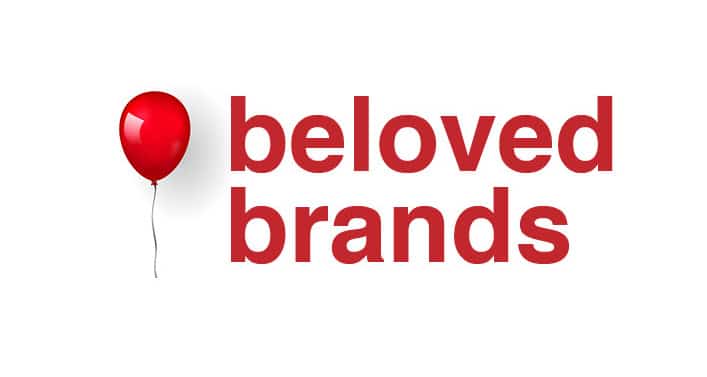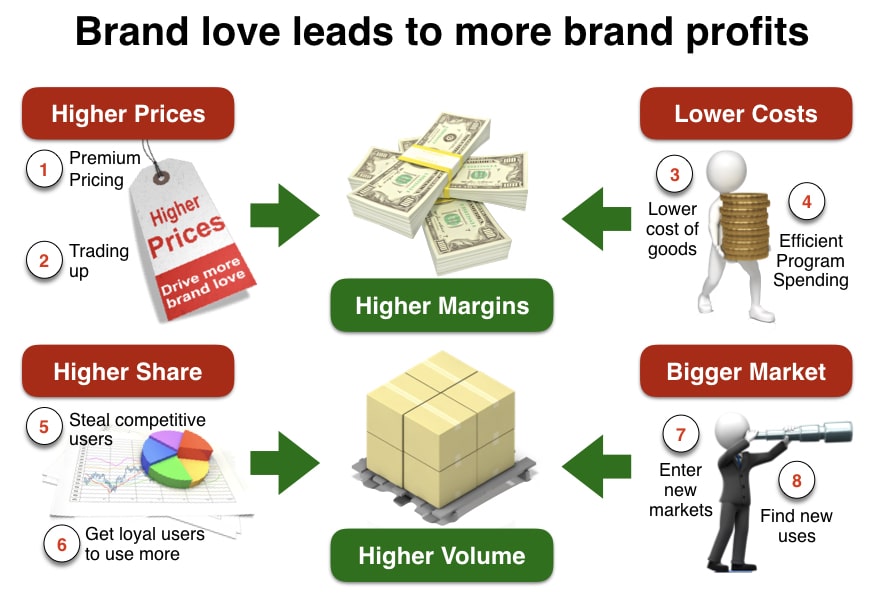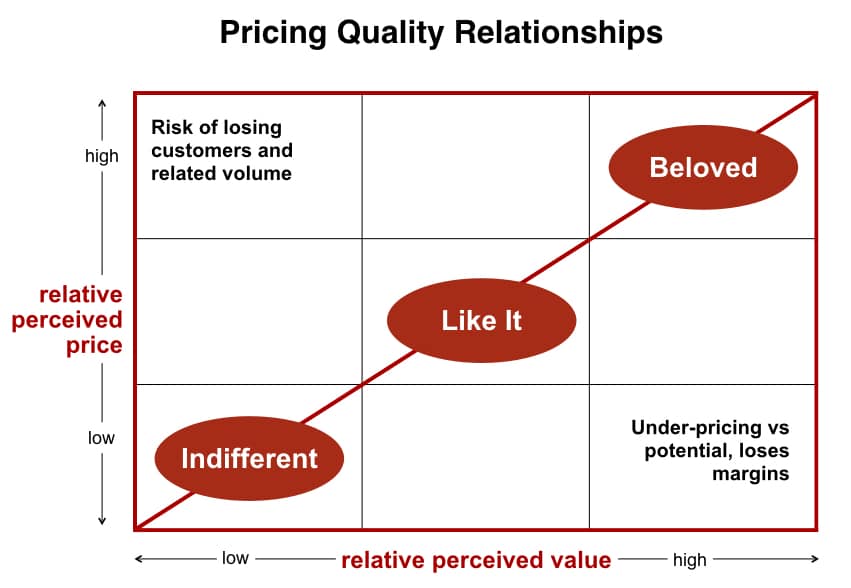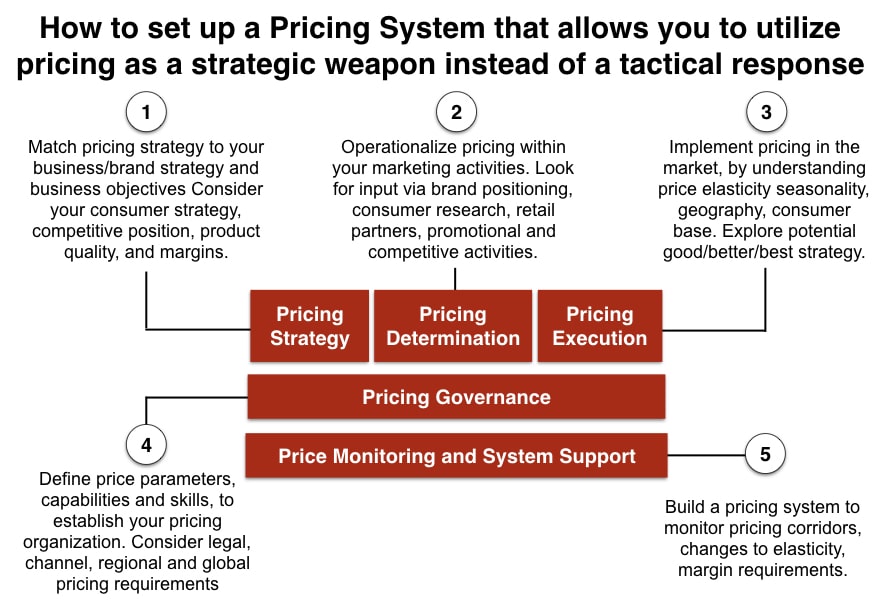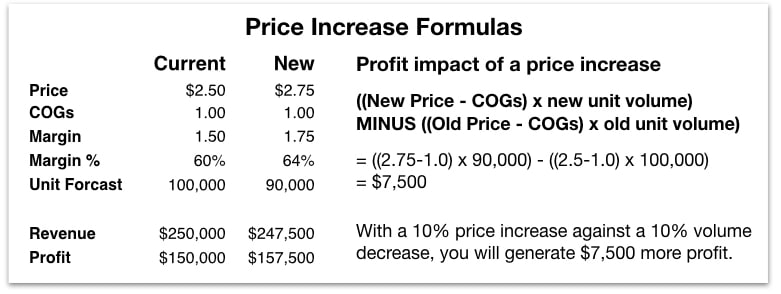The most beloved brands can use their loyal brand lovers to command a premium price, generating a relatively inelastic price. Moreover, the most beloved brands can get consumers to trade up to more premium versions of the brand.
Anyone who does not include “profit” in their definition of a brand has never run a brand before. To me, a product is a basic commodity you sell. A brand creates a bond that leads to a power and profit beyond what the product alone can achieve.
If you want to succeed in brand management, you have to understand brand finance. After all, you are running a business. If you only like the activity of marketing, then you should become a subject matter expert, because if you cannot work the finances of your brand, you will not get promoted beyond brand manager.
With all the love and power the beloved brand generates, it becomes easy to translate that stored power into sales growth, profit, and market valuation.
Profitability
Here are the eight ways a brand can drive profits:
- Premium pricing
- Trading up on price
- Lower cost of goods
- Lower sales and marketing costs
- Stealing competitive users
- Getting loyal users to use more
- Entering new markets
- Finding new uses for the brand.
How to use premium pricing
While many marketers think of price as a defensive response to counter inflation or a competitive reaction at the retail shelf, the smartest brand leaders use price as a weapon to drive brand value.
It is crucial to understand the price/quality relationship of your brand and look for ways to increase the perception of quality. When you find a unique position, which you know motivates consumers, it can differentiate you from competitors. Then you can use the motivation to tighten the bond with your consumers.
The chart shows a relatively long-term direct correlation between perceived value and price. An indifferent brand has low perceived value and will end up with a much lower price point. A beloved brand can use its emotional connection to drive perceived value and ensure the price premium is perceived as good value. For instance, consumers are undoubtedly willing to pay $5 for a Starbucks latte, $500 for an iPad or $100,000+ for a Mercedes. The same consumers will price shop on brands where they have no feelings. A beloved brand has an inelastic price, which means the quantity demanded does not change very much when the price changes.
Premium Pricing
Simply put, brands can execute a price increase when the market or consumers allow the brand to do so. A beloved brand will have an easier time pushing through a price increase as it can use the power of its brand versus consumers, competitors, or channels. When pushing a price increase through retail channel partners, brands usually require proof that the new price will work or that product costs have increased. Factors that help the brand story include the brand’s health and market.
Value Pricing:
Use this tactic when battling a competitor due to sluggish economic conditions or retail channel pressure. You can also use an aggressive price decrease when you have a cost advantage, whether that’s manufacturing, materials, or distribution. When you have that cost advantage, it may make sense to deploy a lower price to deplete your competitor’s resources.
Price changes always carry a risk of a competitive overreaction. Always consider various potential competitive reactions when doing your financial analysis. Be careful. As difficult as it is to implement a price change, it is almost impossible to change it back.
M A R K E T I N G B O O K
beloved brands
The playbook for how to create a brand your consumers will love
Beloved Brands is your secret weapon to guide you through every challenge that you face in managing your brand
Get ready to challenge your mind as we take you on a deep dive to find the most thought-provoking strategic thinking questions that will help you see your brand in a whole new light.
Our unique process for defining your brand positioning will push you to find fresh ideas and new possibilities for how to differentiate your brand based on both functional and emotional benefits.
But we won’t just leave you with ideas – we show how to transform your thinking into action.
Learn how to write a brand plan that everyone can follow, ensuring that all stakeholders are aligned and contributing to your brand’s success.
We’ll walk you through the marketing execution process, from writing an inspiring brief to making smart and breakthrough decisions on both creative advertising and innovation.
And when it comes to analyzing your brand’s performance, we’ve got you covered. Learn how to conduct a dive deep audit on your brand to uncover key issues that you never knew existed.
And, don't just take our word for it: our Amazon reviews speak for themselves.
With over 85% of our customers giving us a glowing five-star rating and an overall rating of 4.8 out of 5.0, we know we’re doing something right. And with numerous weeks as the #1 bestseller in brand management, you can trust that we have the experience and expertise to help you achieve success.
"The cheat code for brand managers!"
“It is without a doubt the most practical book for those who want to follow brand management that I have ever read in my life! Beloved Brands is written by a real, experienced marketeer for marketers. This book contains methodologies, tools, templates and thought processes that Graham actually used and uses in his career.”
Read our sample chapter on strategic thinking
Build a pricing system to match your brand strategy
Rather than using price as a defensive tool, every brand should manage a pricing strategy that matches their brand strategy. Below is a potential pricing system with five critical questions around price strategy, how to determine and execute your brand’s price, how to build parameters to govern your price corridors, then how to monitor pricing. The complexity of the system can depend on how important or how variable the price is to your brand. Revisit your price strategy annually as part of your deep dive business review.
Trade the consumer up or down
Another strategy is to create a range of products at various price levels, with a good/better/best approach that allows the brand to reach up or down to a new segment of consumers. Make sure that you are doing this for the right reason or it could backfire on you.
Trading consumers up on price:
Make sure your brand can carve out a meaningful difference to create a second or third tier, so consumers can see an apparent reason to move up. Many brands will deploy a good/better/best approach to pricing. When your brand secures trust or a bond with the consumer, it will be easier to use your brand reputation and product performance to move loyal consumers up to the next level.
Trading consumers down:
When the brand sees a potential unserved market, it can trade consumers down when the move brings minimal damage to the brand image or reputation. In a tough economy, creating a lower-priced set of products can be a smarter strategy than lowering the overall price of your main brand. Once the economy bounces back, you can discontinue the lower-priced product option.
There are a few cautions around trying to trade consumers up or down. Be careful not to lose your focus on the brand’s core business or image. Stay focused because brands struggle when they try to be all things to everyone. When trading down, try to take costs out of the product to ensure margins rates stay consistent. For a mass brand going through retail channels, it can be challenging to manage multiple price levels. The products with lower sales may receive poor shelf placement and miss out on retailer-merchandising tools.
Financial calculations
Financial calculations for a price increase will impact both revenue and profits. You should do an elasticity market research test to find out how your brand will perform.
In this example, the price goes from $2.50 up to $2.75, only a 10% price increase. I assumed the cost of goods remained flat and I used a forecasted sales decline on units sold. The sales revenue falls slightly, but the profit goes up by $7,500 or by 4.6%.
